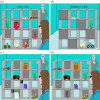Perspective-taking abilities in the balance between autism tendencies and psychosis proneness
- PMID: 25972469
- PMCID: PMC4455812
- DOI: 10.1098/rspb.2015.0563
Perspective-taking abilities in the balance between autism tendencies and psychosis proneness
Abstract
Difficulties with the ability to appreciate the perspective of others (mentalizing) is central to both autism and schizophrenia spectrum disorders. While the disorders are diagnostically independent, they can co-occur in the same individual. The effect of such co-morbidity is hypothesized to worsen mentalizing abilities. The recent influential 'diametric brain theory', however, suggests that the disorders are etiologically and phenotypically diametrical, predicting opposing effects on one's mentalizing abilities. To test these contrasting hypotheses, we evaluated the effect of psychosis and autism tendencies on the perspective-taking (PT) abilities of 201 neurotypical adults, on the assumption that autism tendencies and psychosis proneness are heritable dimensions of normal variation. We show that while both autism tendencies and psychosis proneness induce PT errors, their interaction reduced these errors. Our study is, to our knowledge, the first to observe that co-occurring autistic and psychotic traits can exert opposing influences on performance, producing a normalizing effect possibly by way of their diametrical effects on socio-cognitive abilities. This advances the notion that some individuals may, to some extent, be buffered against developing either illness or present fewer symptoms owing to a balanced expression of autistic and psychosis liability.
Keywords: comorbidity; diametric; psychiatry; social cognition; theory of mind.
© 2015 The Author(s) Published by the Royal Society. All rights reserved.
Figures



References
-
- Nylander L, Lugnegård T, Hallerbäck MU. 2008. Autism spectrum disorders and schizophrenia spectrum disorders: is there a connection? A literature review and some suggestions for future clinical research. Clin. Neuropsychiatry 5, 43–54.
MeSH terms
LinkOut - more resources
Full Text Sources
Other Literature Sources
Medical

